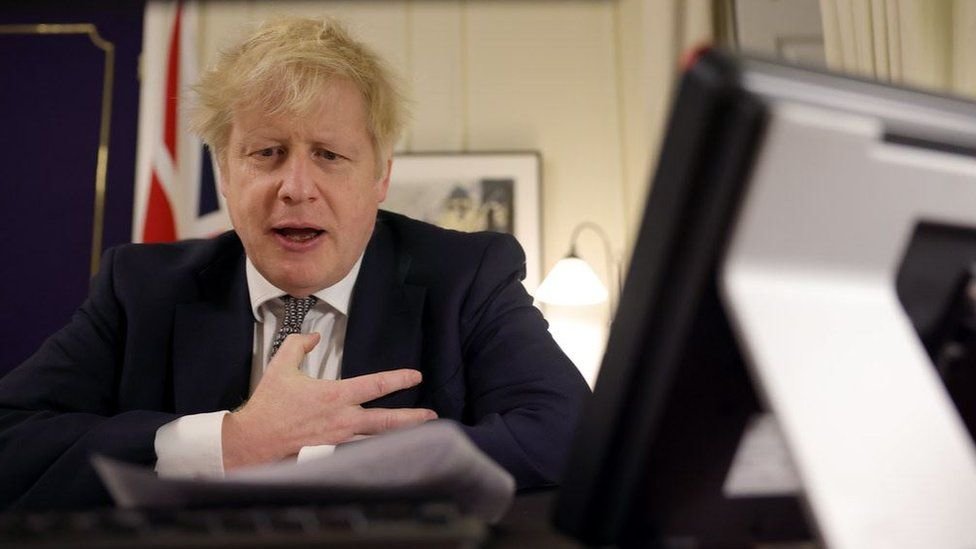Talks to reach a post-Brexit trade deal are in a "serious situation", Boris Johnson said after a call with the EU Commission head Ursula von der Leyen.

He warned that "time was short" and that a no deal scenario was "very likely" unless the EU position changed "substantially".
Mrs von der Leyen said it would be "very challenging" to bridge the "big differences", particularly on fish.
However, she also welcomed "substantial progress on many issues".
Talks in Brussels will continue on Friday, with two weeks to go before the UK leaves EU trading rules.
In a statement issued after the phone call, No 10 said: "He [Mr Johnson] said that we were making every effort to accommodate reasonable EU requests on the level playing field, but even though the gap had narrowed some fundamental areas remained difficult.
"On fisheries he stressed that the UK could not accept a situation where it was the only sovereign country in the world not to be able to control access to its own waters for an extended period and to be faced with fisheries quotas which hugely disadvantaged its own industry.
"The EU's position in this area was simply not reasonable and if there was to be an agreement it needed to shift significantly."
The UK's chief negotiator David Frost echoed the prime minister's tone, tweeting: "The situation in our talks with the EU is very serious tonight. Progress seems blocked and time is running out."
European Parliament leaders have set Sunday as a deadline for them to see the text of any deal agreed by the negotiating teams.
The senior MEPs said they would "not be rushed" into approving an agreement at their end, and would have to see the text by the end of the week if they were to sign it off by 31 December.
The basics
* Brexit happened but rules didn't change at once: The UK left the European Union on 31 January 2020, but leaders needed time to negotiate a deal for life afterwards - they got 11 months.
* Talks are happening: The UK and the EU have until 31 December 2020 to agree a trade deal as well as other things, such as fishing rights.
* If there is no deal: Border checks and taxes will be introduced for goods travelling between the UK and the EU. But deal or no deal, we will still see changes.
The call came after minister Michael Gove warned talks may go on until after Christmas. He said that while Christmas Day would be "sacrosanct", it was possible that Parliament could be recalled to approve a Brexit deal.
Parliament closed for the Christmas break on Thursday evening.
Mr Gove also said that although the European Parliament has said it would not have time to ratify a deal if it was not concluded by Sunday, they could "apply provisional application of the treaty".
He told the Commons Brexit Committee the "most likely outcome" was that the current transition period would end on December 31 without a deal.
Asked how likely a deal is, he replied "I think, regrettably, the chances are more likely that we won't secure an agreement. So at the moment less than 50%."

It's long been predicted that competition rules and fishing would be the last areas where compromise is found.
For Boris Johnson's government, being tied to EU regulations in perpetuity defeats the purpose of Brexit and makes a mockery of "taking back control".
For the European Union, it will not allow its internal market to be undermined by offering the UK unfair access.
Ursula von der Leyen has claimed the two sides have made a significant step by agreeing to a "strong mechanism" to ensure neither side lowers their environmental or social standards, but are yet to agree on how each could diverge from these levels in the future.
A good number of EU diplomats were quietly confident it was a matter of when, not if, EU access to UK fishing waters could be sorted. But it's proving trickier than they thought.
Sources tell me that Michel Barnier explained to EU ambassadors at the start of this week that if fishing is resolved, then a wider deal would quickly fall into place.
But there's no sign of a meeting of minds on fish, with the EU warning openly it may prove to be impossible.
But let's remember this is the most intense of negotiations and that every public proclamation from London or Brussels will be chosen to strengthening their respective hands in what are the final days and hours of talks.
Although there is only 14 days until the deadline, Mr Gove said he believed there was enough time for the necessary legislation to pass before 31 December "to give businesses legal certainty".
But a number of opposition MPs raised issues already facing businesses waiting to discover the outcome of talks.
One Welsh MP, Jonathan Edwards, said: "I was contacted late last night by a businessman in my constituency who is reliant on imports from the continent and he can't find a haulage firm willing to carriage on his behalf due to the current delays at the ports.
"He's very concerned unless this issue was resolved his business would not survive into the new year."
Mr Gove said he would get in touch with the business concerned.















